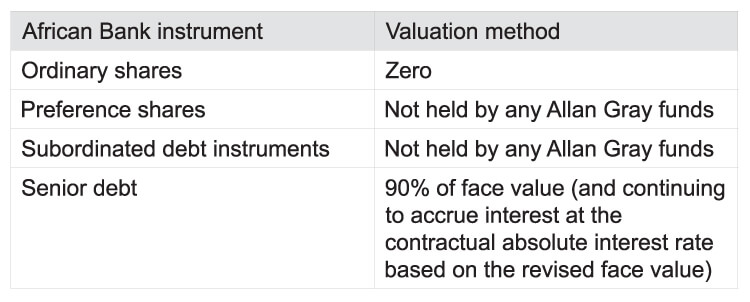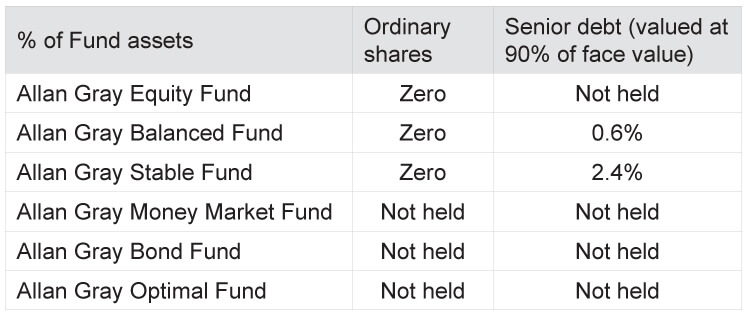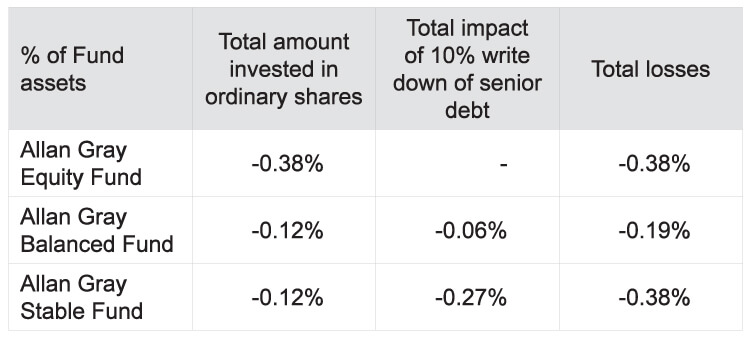African Bank’s failure has had a small, negative impact on our Allan Gray Equity, Balanced and Stable Funds. In this GrayIssue we attempt to address a broad range of client queries regarding our exposure.
The Registrar of Banks placed African Bank under curatorship on 10 August 2014. Trading in African Bank debt and equity securities was suspended on 11 August 2014. All calculations and conclusions in this article are based on our understanding of the announcement by the Governor of the South African Reserve Bank on 10 August 2014.
We have revalued African Bank securities
We have valued African Bank securities held in the Allan Gray Unit Trusts as follows:

The unit trust prices of 11 August 2014 reflect the valuation methods shown above. In other words, any losses suffered by valuing the ordinary shares at zero, or by writing down senior debt instruments by 10%, are already reflected in the fund prices and performance data to 11 August 2014.
We will review these values if relevant new information is published or if our understanding of the published information requires revision.
Looking forward: remaining exposure
The domestic Allan Gray Unit Trusts had the following total exposure to African Bank securities on 11 August 2014 after applying the valuation methods detailed above:

The South African Reserve Bank (SARB)’s announcement that it will be buying African Bank’s ‘bad book’ for R7 billion, and that a consortium including South Africa’s big four banks and the Public Investment Corporation (PIC) will be underwriting a R10 billion capital raise for the ‘good bank’, lends substantial credibility to the SARB’s plan for senior debt to be transferred to the ‘good bank’ at 90% of face value. We cannot be absolutely certain that this will happen, but we believe that 90% of face value is currently the most accurate valuation for the senior debt.
Looking back: recent impact
The estimated impact of the change in value of all African Bank securities on the change in unit prices from 5 August 2014 (before the African Bank trading update) to 11 August 2014 is as follows:

Looking back: total impact over the full holding period
We understand that some clients may be curious to know the total extent of the losses suffered over the full holding period of our African Bank exposure (as opposed to just the recent impact shown above).
The total amount invested in the ordinary shares and the impact of the 10% write down of senior debt, expressed as a percentage of each fund’s total assets, can give a rough approximation of losses suffered over the full holding period. These losses include the losses shown in the recent impact table above.

Looking back: investment in ordinary shares
Our investment in the ordinary shares has detracted from fund returns, but fortunately the position size was limited by our peer review investment process. We will always have winning and losing positions. We aim to have more exposure to bigger winners, and to limit our exposure to losers so that the winners outweigh the losers. The net result is reflected in our funds’ total returns.
After African Bank’s trading update on 6 August 2014, we marginally increased our position in the ordinary shares at prices around 50 cents per share. The additional amount invested was an immaterial percentage of fund assets (less than 0.01%). At that stage, we viewed the only remaining potential value in the ordinary shares as the pre-emptive right (or option) to subscribe to a future capital raise. The SARB announcement indicates that ordinary shareholders will indeed have the option to participate in the capital raise, but the terms are unknown and it is not clear to what extent this opportunity will be shared with subordinated or other debt holders. When more detailed terms of African Bank’s restructuring are announced it will become clear whether or not our assessment of the option value was correct, but in the meantime all ordinary shares are carried at zero value (placing zero value on the option to subscribe to the proposed capital raise for the ‘good bank’).
Looking back: investment in senior bonds
The 10% write down of the senior debt has detracted from fund returns. This is not nearly as severe as the 100% write down experienced by holders of the subordinated debt and shares. This is how it should be. The claims of senior debt holders take preference over the claims of subordinated debt holders and over all classes of shares.
When we bought exposure to African Bank’s senior debt, the Bank’s equity and subordinated debt capital provided a substantial buffer against the Bank’s underperforming loan book. As it turns out, this buffer will substantially soften the blow for senior debt holders, but it is not sufficient to avert a 10% writedown of the senior debt.
It is important to note that the African Bank senior debt held by our unit trusts pays a much higher interest rate than could be earned on comparable risk-free securities. If African Bank or the ‘good bank’ honours the contractual interest rates on 90% of the instruments’ face value, then the ‘spread’ or higher interest rate earned on these instruments over time until they mature should compensate substantially for the recent 10% write down of face value.
Allan Gray Stable Fund
The Stable Fund has a dual objective: to produce long-term returns superior to bank deposits and to minimise the risk of loss over any two-year period. This dual objective requires the Stable Fund to take measured risks. Some of the risky positions will prove to be winners and some will prove to be losers. We strive to avoid all losers, but we recognise that there will probably always be some positions which detract from fund returns. We carefully consider position sizes so that losing positions are hopefully never catastrophic for the Fund.
Many of the measured risks assumed by the Stable Fund over the last two years have been rewarding. Despite the losses from its exposure to African Bank, the Fund has returned 11.5% per annum over the last two years (compared to its benchmark of 6.3% and CPI inflation of 6.1%).
We continue to look for opportunities to take measured risks which we hope will result in the Stable Fund achieving its objectives over the long term.